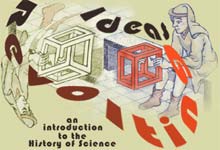
University of California, Irvine
Instructor: Dr. Barbara J. Becker

|
Dialogues Concerning Natural Religion (1779) by David Hume (1711-1776) |
That a stone will fall, that fire will burn, that the earth has solidity, we have observed a thousand and a thousand times; and when any new instance of this nature is presented, we draw without hesitation the accustomed inference. The exact similarity of the cases gives us a perfect assurance of a similar event; and a stronger evidence is never desired nor sought after. But wherever you depart, in the least, from the similarity of the cases, you diminish proportionably the evidence; and may at last bring it to a very weak analogy, which is confessedly liable to error and uncertainty.
After having experienced the circulation of the blood in human creatures, we make no doubt that it takes place in [every person we meet]. But from its circulation in frogs and fishes, it is only a presumption, though a strong one, from analogy, that it takes place in men and other animals. The analogical reasoning is much weaker, when we infer the circulation of the sap in vegetables from our experience that the blood circulates in animals; and those, who hastily followed that imperfect analogy, are found, by more accurate experiments, to have been mistaken.
If we see a house ... we conclude, with the greatest certainty, that it had an architect or builder; because this is precisely that species of effect which we have experienced to proceed from that species of cause. But surely you will not affirm, that the universe bears such a resemblance to a house that we can with the same certainty infer a similar cause, or that the analogy is here entire and perfect. The dissimilitude is so striking, that the utmost you can here pretend to is a guess, a conjecture, a presumption concerning a similar cause; and how that pretension will be received in the world, I leave you to consider....
Throw several pieces of steel together, without shape or form; they will never arrange themselves so as to compose a watch. Stone, and mortar, and wood, without an architect, never erect a house. But the ideas in a human mind, we see, by an unknown, inexplicable economy, arrange themselves so as to form the plan of a watch or house. Experience, therefore, proves, that there is an original principle of order in mind, not in matter. From similar effects we infer similar causes.
[But u]nless the cases be exactly similar, they repose no perfect confidence in applying their past observation to any particular phenomenon. Every alteration of circumstances occasions a doubt concerning the event; and it requires new experiments to prove certainly, that the new circumstances are of no moment or importance....
Thought, design, intelligence, such as we discover in men and other animals, is no more than one of the springs and principles of the universe, as well as heat or cold, attraction or repulsion, and a hundred others, which fall under daily observation. It is an active cause, by which some particular parts of nature, we find, produce alterations on other parts. But can a conclusion, with any propriety, be transferred from parts to the whole? Does not the great disproportion bar all comparison and inference? From observing the growth of a hair, can we learn any thing concerning the generation of a man? Would the manner of a leaf's blowing, even though perfectly known, afford us any instruction concerning the vegetation of a tree?...
[W]hy select so minute, so weak, so bounded a principle, as the reason and design of animals is found to be upon this planet? What peculiar privilege has this little agitation of the brain which we call thought, that we must thus make it the model of the whole universe?...
[Just because s]tone, wood, brick, iron, brass, have not, at this time, in this minute globe of earth, an order or arrangement without human art and contrivance; [can we conclude] therefore the universe could not originally attain its order and arrangement, without something similar to human art[?]
|